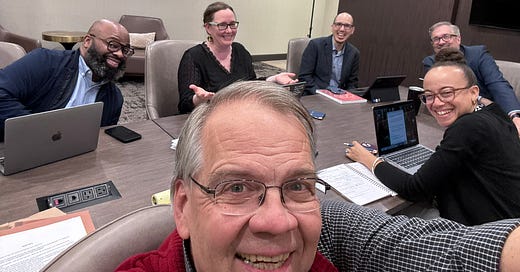Welcome back! (Or welcome!)
If your life is like mine right now (and I know that it is for some of you), reflection time feels limited. Finding that time, however, matters.
We learn by reflecting on experiences.
I’m part of Arbor Research Group. We spent two days last week visiting a not-for-profit we’re helping. I was part of four executive interviews, seven focus groups, and conversations with my colleagues. It was a delight to be learning and listening and exploring. And even after two full days, we have no conclusion or recommendations or answers. Yet. In a couple months we’ll know more when we’ve had time to ask more questions, to study the answers, to create a survey and then study those answers.
For our work as research consultants, reflection is essential. We can see patterns. We can connect dots and thoughts. We can discern threads.
For our work as humans, and as people who help humans, reflection is just as essential.
If all we have is experiences without taking time and space to be quiet with those experiences, to step back and ask ourselves, “What was happening?”, we actually may not learn anything.
And we may be merely distracted if all we have is a constant stream of information and opinion without time to say, “Is that true? How do I know it’s true? Is that helpful? How is it helpful?”
Listening carefully to people who are grieving and then reflecting before acting and speaking is a learned practice. And is the best way to help people as people.
+++
People are different than us, and yet consistent with themselves, as they grieve.
“He was a people-gatherer.”
That’s how the woman—minutes into what we call “being a widow”—described her husband.
“I need to remember that,” I said. And I did.
She likes people, but she’s more likely to fix lunch than to have the huge network of relationships and acquaintanceships that draw people together.
And in these moments when she was already wondering what to do in the next hours and days, she was aware that the differences that were evident in their decades together are now going to affect her life alone.
It was a reminder that people are different. Those differences are apparent in the way we live. Some people need crowds. Some people need companions. Some people need chaos. Some people need clarity.
Those differences are apparent, if we are observant, in the way people live after a loved one dies.
The other day someone told me about a friend whose child died.
In one of those conversations which asks if there is anything a person needs, this friend said, “I’m the one who fixes meals. I appreciate all the prepared foods and help, but what I most need right now is to cook.”
As I sat with my new friend and her husband’s body, connected only by the minutes before and after a death, I listened. I made sure she had tissues. I helped her cover him.
And I resisted the urge to bring the wastebasket next to her chair.
I realized that she needed to move, she needed to have a reason to move away from the bed and then come back. I realized that a woman who was used to working behind the scenes to provide hospitality still needed some agency, some space to do the things she does.
Sometimes the way we can be most helpful is to help people have space to do the things they do to live. To cook. To throw away tissues. To laugh. To cry. To weep.
Hui-Wen Sato talks about going to work in the middle of her family’s medical crises:
“…I also went to work because I really, really wanted to.
I didn’t just need the sense of normalcy, the time with dear friends at work, and the income.
I needed the things my patients and their families taught me about suffering and endurance.”
All this is a reminder that there are no formulas when living as bereaved people. There are no recipes, there are no short-cuts.
There are always, however, people. Living, struggling, juggling, confused people. We can be helpful. We can listen. And we can love.
+++
This week I thought, “church people spend way more time talking about life after death for the dead, and not nearly enough time talking about life after death for the living.”
Just a thought. Don’t know what it means yet. But I’ll keep working.
Thanks for reading. Thanks for supporting this newsletter by buying me coffee.
Thanks for caring for people.
See you next week.
Jon





